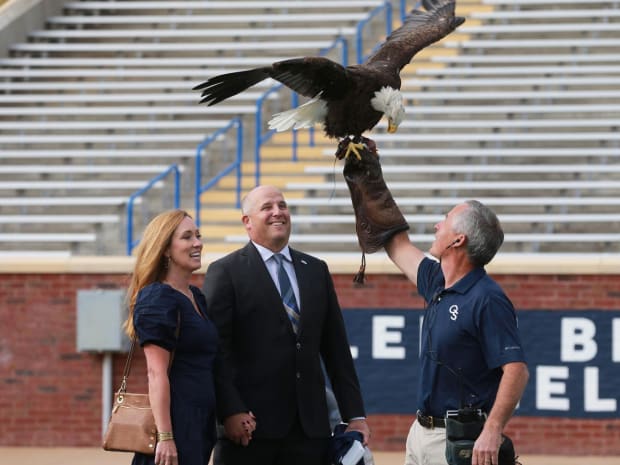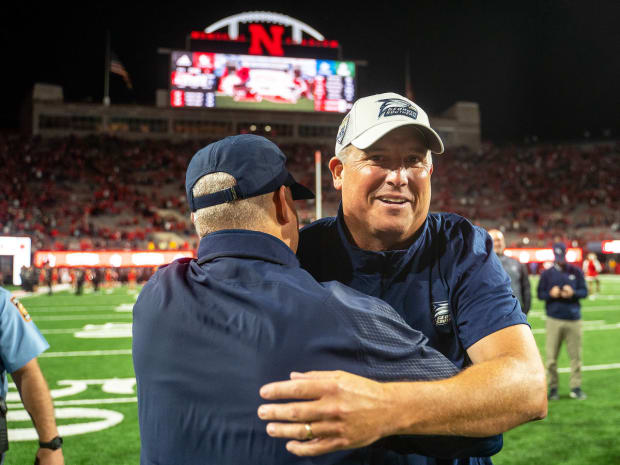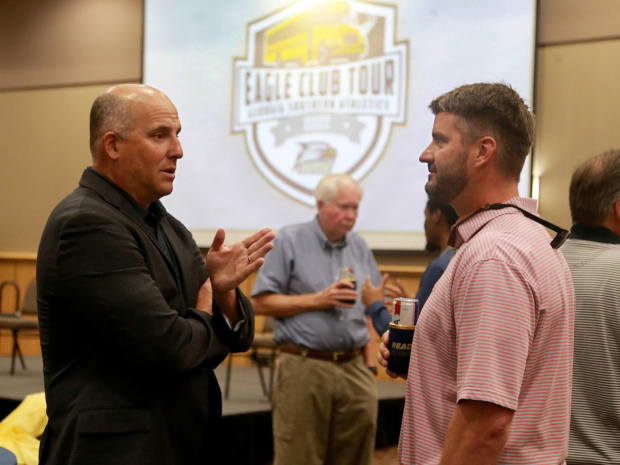Erk Russell once coined Statesboro, Ga., the Gnat Capital of the World.
It’s hot here and it’s humid. The narrow strip of water cutting across the Georgia Southern campus, officially dubbed Beautiful Eagle Creek, is a breeding ground for the small, pesky insects. They annoyingly buzz about in swarms. After all, have you ever seen just one gnat?
They are so prevalent here that one of the town’s most popular hangouts is named for them. Gnat’s Landing, a burger-and-shake dive situated just off campus, is where Georgia Southern coaches take prospective athletes during recruiting visits.
No fancy steakhouse. No palm-tree-lined driveway. No sandy beach or garden rooftop. But a place called Gnat’s.
“We’ve also got two Walmarts,” says Kevin Whitley, a former Georgia Southern All-American defensive back who now coaches cornerbacks here. “Two Walmarts,” he repeats. “That’s all you need. Target would be too much for us.”
This is Clay Helton’s new home, the Low Country of east Georgia, among forests of pine, oak and dogwood, surrounded by his people in his part of the world, a cultural and geographic polar opposite to his last stop 2,500 miles away in Los Angeles.

Richard Burkhart/Savannah Morning News/USA TODAY NETWORK
During the first few months on the job, he’d chuckle when locals asked about his “big adjustment” to the Deep South.
“I played football for Pat Dye at Auburn and was born in Gainesville, Fla.,” he laughs. “When they hear my twang, they know. ‘Oh, you’re from ’round here.’”
Two weeks into his first season, Helton notched a signature win as Georgia Southern’s football coach. Among a slew of upsets last weekend, the Eagles toppled Nebraska in Memorial Stadium in a back-and-forth 45–42 thriller that served as both the final straw of the Scott Frost era and a resounding win for a school that is attempting to find stability.
A proud program built on the triple option, the Eagles have slipped into mediocrity since their move to FBS in 2014. They haven’t won a conference title in eight years and are on their fourth coach since ’15. Losing isn’t normal at a place that won six FCS championships in a 16-year span starting with the Erk Russell–coached team in 1985.
In search of titles, the university hired a progressive young athletic director with SEC roots, Jared Benko, and last fall, Benko hired Helton after an exhaustive search that included 17 candidates. On Saturday in Lincoln, it all came together.
It reminded Helton of the message Benko delivered to him during the interview process last fall: “Sun Belt championships are nice, but we really want to be the national story and on the national stage.” Well, here it is.
“Even two games in, people are saying Georgia Southern football is back on track,” says Benko, hired at GSU amid the pandemic in the spring of 2020. “People are excited. It’s a lot of fun to tell the story of where we’re going.”
Where’s that? It depends on Helton, his staff and a group of players led by a sixth-year quarterback who transferred in this spring. Kyle Vantrease, the same QB who helped deliver Buffalo a MAC division title in 2020, completed 37 passes for 409 yards against the Huskers.
Like so many within this program, Vantrease carries with him a “chip on his shoulder,” says Helton. It’s a cliché, yes, but it’s real. That goes for the coach, too.
“It’s every one of us,” Helton says. “It’s all of us. It’s our opportunity to do something special. Think about us as coaches. It’s my second opportunity and it’s Coach [Bryan] Ellis’s second opportunity as an offensive coordinator.”

Dylan Widger/USA TODAY Sports
Ellis, 34, is a longtime Helton family assistant. He was coached at UAB by Clay’s brother Tyson. He worked under Clay at USC for two years and spent the last three with Tyson at Western Kentucky. Vantrease operates in an offensive system that Ellis brought from WKU, a spread, pass-heavy scheme that helped the Hilltoppers win Conference USA last season and finish second nationally in total offense (536 yards a game).
On Saturday, the Eagles carved through the Nebraska defense, rolling up more yards than any Huskers team had ever given up at home (642). The credit, Helton says, goes to Vantrease and a set of talented receivers whose skills surprised the coach when he arrived last spring.
Benko hired Helton on Nov. 2, four weeks before the season ended and six weeks after USC fired the coach. It gave Helton the ability to evaluate the team, staff and get a jump start on recruiting. He spent each day last November visiting every high school in a three-hour radius and then watching his new team practice. He noticed something immediately: He didn’t expect an option program to have skill players with such speed.
“Those 40 days between being hired and Signing Day were critical to our success,” Helton says. “Jared made a hell of a decision. It was progressive.”
Benko’s hiring process was intensive. He spoke to 17 coaches before cutting to a final group. He declines to reveal any names, but it is believed that then Texas A&M defensive coordinator Mike Elko, eventually hired as Duke’s head, was a finalist.
So why Helton? The better question, maybe, is why Georgia Southern? Helton didn’t need this. USC owed him more than $10 million to buy out his contract. He’s only 49. And he and wife Angela are now empty nesters, their three children all out of the house.
During the six weeks off last fall, Helton realized just how much he missed coaching. He’s not made, he says, for the “civilian world.” He jokes that he was the best dog walker in Southern California. It’s not really something that got him excited.
“I’ve got a lot of ball and education and life for kids still in me,” he says. “I was looking not only for the next opportunity but a great opportunity. I got a call from [agent] Jimmy Sexton and he said, ‘Will you take a call from Jared Benko?’”
The commitment was there, Helton says. His hire coincided with an increase in staff and athlete support and a fundraising boom. In his first year with the school, and despite the pandemic, Benko and staff raised $6.3 million in donations, by far the most in program history, he says. The department raised $10.6 million this past fiscal year. GSU is in the process of building a $15 million indoor facility and a $65 million dual-purpose basketball arena. Officials are planning for a baseball facility, too, hoping to take advantage of the baseball team’s success last year (the Eagles were an NCAA regional host).

Richard Burkhart/Savannah Morning News/USA TODAY NETWORK
On the football staff, they added a second full-time football strength coach and a graduate assistant, as well as a football-only nutritionist. In recruiting, they went from two to five full-time staff members.
“You have people here who have been at a Power 5 school. That’s their vision for this place,” says Robert Stiner, the program’s strength coach who was with Helton at USC and spent time at Notre Dame. “Jared talks about being the gold standard, not just in the G5 but across the nation.”
Benko and Helton are constructing Georgia Southern like athletic director Bryan Maggard and coach Billy Napier built Louisiana in Lafayette, he says. You take the SEC model and then you scale it down. “We are no different here,” Benko says. “We don’t have the war chest of the SEC, but the model is the same.”
USC’s annual athletic budget is believed to be more than $125 million. Georgia Southern’s budget hovers around $30 million. “It doesn’t mean that when you have a little less money you can’t do great things,” Helton says. “We’ve seen that out of Central Florida, seen that from Cincinnati, seen that out of Memphis.”
Maybe the money here isn’t the same as L.A., but there are perks. Statesboro, a town of about 30,000, is built around the university and its athletic programs. GSU football here is life. Helton realized that last fall when a three-win team filled the school’s 25,000-seat stadium for a game against BYU.
Another upside: the recruiting. Per capita, Georgia is routinely ranked as a top-three state for high school football prospects, if not No. 1. The Atlanta metro area is especially a hub. It’s a three-hour drive from here. Of the 22 high school players GSU signed last class, 19 of them were from Georgia.
“You don’t need to leave the state to find what you need,” Whitley says. “I’ve never been on a plane recruiting. And we’re not going to get on a plane recruiting.”
It’s a far cry from the national recruiting philosophy at Helton’s last stop. He spent 12 years at USC, first as offensive coordinator, then as interim coach and finally leading the program the last five years (plus two games in 2021). He went 46–24, won three division titles and the conference championship in his third season in ’17. He has no regrets about his tenure there and he holds no resentment for those who fired him.
In fact, unprompted during an interview this week, Helton says of the 2–0 Trojans, “How about USC? So proud of them. Lincoln [Riley] is doing a great job.” USC AD Mike Bohn and Helton shared texts over the weekend. Bohn texted him, “Really proud of you!”
This isn’t your normal post-firing situation. But Helton isn’t your normal coach. He’s been dubbed one of the nicest men in college football, an industry full of paranoid and neurotic coaches with little patience for the media and the public.
Not Helton. “I spent 10 years around Mark Richt in Athens,” says Benko. “He’s a more extroverted Coach Richt with a chip on his shoulder.”
And he’s got the benefit of Gnat’s as well. Helton laughs at the differences between L.A. and Statesboro. The people, the culture, the weather. It couldn’t be more different. But as a guy who spent his entire childhood and 12 years of his professional career in the South, it’s been quite an easy transition—easy enough that he took down the Huskers.
There’s more to come from GSU, too. “This place is on the edge of being great again,” he says.







